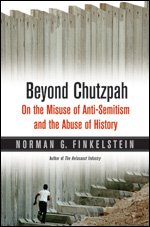Beyond Chutzpah
 The recent publication of the relatively mild critique of the Israel lobby (pdf) by two academics: Professors Stephen Walt of Harvard and the University of Chicago’s John Mearsheimer, has kicked up a storm in the United States.
The recent publication of the relatively mild critique of the Israel lobby (pdf) by two academics: Professors Stephen Walt of Harvard and the University of Chicago’s John Mearsheimer, has kicked up a storm in the United States.The influence of the lobby is, no doubt, very significant with regards to US policies towards Palestine. However, to bring this issue up for discussion is considered taboo, not only in the so-called "respectable circles" (sic) of Harvard and Chicago - but also amongst solidarity activists who have made important contributions in other arenas.
On the other hand, Angry Arab does have an important critique of the Walt/Mearsheimer papers that is worth reading:
..." And my doubts are confirmed on page 40 when the authors state that "the Lobby's influence has been bad for Israel." This shows yet again how the debate on Israel is framed in the US, by those who champion Israel, and by those who are seen as critics of Israel. It is a manifestation of the center of debate on Israel. That even for critics of Israel, the concern or the center of attention is not the victims but the oppressors and occupiers. This is the Tikkun magazine (editor's note: this is Michael Lerner's mag., the liberal zionist): that occupation should be mildly opposed on grounds that it hurts the occupation soldiers and the "soul of Israel and Zionism." And how could anybody argue that the Lobby has been bad for Israel. It has been great for Israel: and you may measure that from every possible perspective. But it is not palatable to argue in the US that something is bad for the Palestinians. Who cares about the plight of the Palestinians."
In his book Beyond Chutzpah, Norman Finkelstein has discussed important concerns about not only Israel, but also the misuse of anti-semitism to stifle discussions about Isareli human rights violations, and the creation of a far worse than aparthied conditions in Palestine. Khalil Bendib, the Muslim American political cartoonist, interviewed Finkelstein in October of last year.
Uncompromising in his methodical truth-telling approach, Professor Finkelstein exposes a number of sensitive truths and taboos from which much of the left still shies away to this day, such as, for example, how class dynamics within the American Jewish community directly affect the struggle for peace and justice in Palestine. His detailed and unflinching critique of the abuse of the term of New Anti-Semitism helps deflate a boogeyman fabricated and manipulated by Israel apologists, opening up, by the same token, a proverbial can of worms from which many of his fellow left thinkers have long run away and abdicated their responsibility. During the program, we will also listen to selections from The wall by Palestinian oud player Wasim Qassis. The selections include the sound tracks of the films The Last Moon, Women in Struggle and The Stolen Youth.
You can listen to this interview by clicking here (web stream) or on the ihsan podcast (click for info. on how to subscribe).




















0 comment(s):
Post a Comment
<< Home